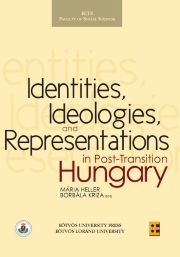 This book focuses on the problems and conflicts experienced by Hungarian society since the system change in 1990. During this time Hungary has become a NATO and EU member state but at the same time the country has undergone major changes, and encountered serious difficulties and challenges.
This book focuses on the problems and conflicts experienced by Hungarian society since the system change in 1990. During this time Hungary has become a NATO and EU member state but at the same time the country has undergone major changes, and encountered serious difficulties and challenges.
Expectations of increasing welfare and stability have given way to deep public disillusionment. Former bonds of solidarity have been destroyed; values and certainties have been shattered and political struggles have reached an unprecedented level of ferocity.
The book deals with social representations of this period of transition, and aims to give a concise picture of the state of democracy in Hungary. It investigates in particular problems of conflicting identities and identity formation, with special attention paid to minorities, representations of national and European values, and characteristics of political ideologies prevailing in public and private discourses.
Full info:
Identities, Ideologies, and Representations in Post-Transition Hungary
Maria Heller and Borbala Kriza (eds), Eötvös University Press, 2012